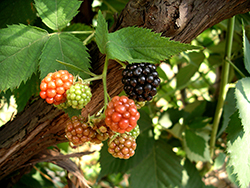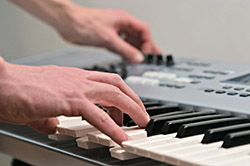 Blackberries can be sooooo delicious when they're soft and sweet, and sooooo disappointing when they're not. I've been picking them on a nearby road where they grow on a fence by a field. It's a great summer for blackberries. There are tons of them, enough to lure me back into berry picking after having given up on it last summer when I seemed to always come home with a bag of tart berries. But this year I discovered bring sweet, juicy berries home. What's more, honing my fruit picking skills has given me insights on creativity and life.
It all began with our plum tree in June. The plums are outrageously delicious -- incredibly sweet, juicy and perfumed with their own unique fragrance, but only when they're really ripe. We learned last year that when they fall off the tree, they are just perfect. Only problem is they often split open when they land, and a bagful of split plums soon degenerates into a mess. The trick then is to get the plum when it's just getting ready to fall, and you can do that by grasping them ever so carefully and giving just the slightest tug. Not a tug even, a faint whisper of a tug... If the plum falls into your hand, it's ripe. If it resists your tug, it's not ready. It may still be good, but not incredible, and why settle for good?
Blackberries can be sooooo delicious when they're soft and sweet, and sooooo disappointing when they're not. I've been picking them on a nearby road where they grow on a fence by a field. It's a great summer for blackberries. There are tons of them, enough to lure me back into berry picking after having given up on it last summer when I seemed to always come home with a bag of tart berries. But this year I discovered bring sweet, juicy berries home. What's more, honing my fruit picking skills has given me insights on creativity and life.
It all began with our plum tree in June. The plums are outrageously delicious -- incredibly sweet, juicy and perfumed with their own unique fragrance, but only when they're really ripe. We learned last year that when they fall off the tree, they are just perfect. Only problem is they often split open when they land, and a bagful of split plums soon degenerates into a mess. The trick then is to get the plum when it's just getting ready to fall, and you can do that by grasping them ever so carefully and giving just the slightest tug. Not a tug even, a faint whisper of a tug... If the plum falls into your hand, it's ripe. If it resists your tug, it's not ready. It may still be good, but not incredible, and why settle for good?
Having mastered plum picking, I was ready for the more delicate task of picking blackberries. One has to be ever so careful, not just dodging thorns, but tugging on the berries just right, being careful not to mush the ones that are truly ripe. It's a delicate operation. It takes patience, sensitivity to the bush's readiness to let go of its fruit. After all, the bush thrives by having bird's eat the berries when they are ripe, when the seeds are ready to be dispersed. There's a reason the fruit gets sweet when it does.
It takes patience to cooperate with the timing of the bush. It takes respect for its natural rhythms to enjoy the treasures it holds. You learn to listen, to cooperate with the life cycle of the bush, and when you do you are rewarded with a berry that drops effortlessly into your hand and tastes incredibly delicious.
Picking berries this way has allowed space for reflection as I pick. Since I am still in the midst of creating a new set of meditations, the parallels in the process of berry picking and giving birth to a new project became obvious. The ideas have to gestate and grow, and when they are ripe, they come easily. Like the berry bush that I return to day after day to cull the berries that are ripe that day, I have to leave the project to mature and ripen at its own pace. I spend time with it and then leave it. It percolates inside me and then when I work on it again, the latest "fruits" are ready for the picking. Inspirations come in their time, and I can't force them.
Letting the new project grow requires the same respect and trust that I'm learning in berry picking. I can't make the berries ripen faster. It's always tempting to try to pull off a berry that isn't really ready. It just doesn't work. It's not fun, actually. It feels as if the bush is resisting. If I do manage to get one off, it doesn't taste good. Creativity can't be forced. It comes in its time fueled by the same vital force that ripens the fruit. Sure, you can make sure a fruit tree is planted in the sun and gets enough water and fertilizer, but then you just have to wait. You can nourish yourself with adequate rest, exercise, meditation -- but you still have to wait.
My fruit picking is teaching me that patience, respect, and trust. The blackberry bush is teaching me its lesson as I learn to listen. The new project will be finished on its schedule, in its time. I can try to push it, but it will only result in frustration and will get me nowhere. Or I can surrender to the process. I don't have any more ability to hasten the creation of my new meditations than I have the ability to make the fruit ripen. This realization is humbling, and it's also a relief. If I don't seem to be making progress on a project, I can just let it go, knowing it will come in its time.
Related posts:






